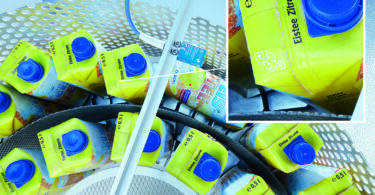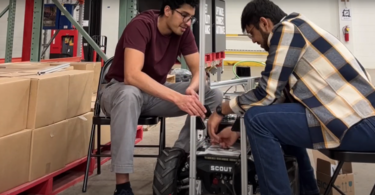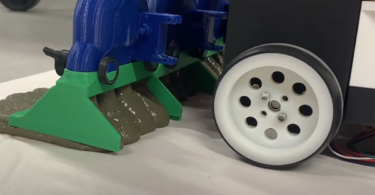 Since 2007, universities and research facilities have been competing against one another at the SICK robot day, yielding the (playing) field to robots. Eight international teams of students registered for this year’s competition which took place on October 8, 2016. The robots had to fill a playing field defined by RFID tags with colored dice. To help in this task, SICK provided each of the team with a SICK RFU620 sensor in advance, which the students installed into their robot vehicles.
Since 2007, universities and research facilities have been competing against one another at the SICK robot day, yielding the (playing) field to robots. Eight international teams of students registered for this year’s competition which took place on October 8, 2016. The robots had to fill a playing field defined by RFID tags with colored dice. To help in this task, SICK provided each of the team with a SICK RFU620 sensor in advance, which the students installed into their robot vehicles.
The individual playing fields were fitted with coded RFID tags (“radio tags”) to guide the vehicles. Two robots competed against one another in each round and whichever robot filled most of the 25 defined fields with its dice after ten minutes won; the points were evaluated in the overall comparison. Naturally, the robots were not allowed to rely on “human assistance”, such as remote control, and unpermitted technical aids would have meant disqualification.
Points were also deducted for correcting foam dice that had already been placed and collisions were, of course, forbidden. In the end, beating competition from Germany and the Czech Republic, the team Cogito MART from the Charles University in Prague was victorious. Second place went to the team CS Freiburg from the University of Freiburg, and the team EDUROUni from the Czech University of Life Science in Prague came in third. All three places were awarded cash prizes.
Intelligent mobility
SICK uses robot day as another opportunity to show that sensor intelligence is a promise to the present and the future that is being pursued and promoted within the company. Sensor technology as the data supplier for intelligent factory and process automation is already a reality and is set to quickly gain importance in the future. With sensor technology and software for localization, navigation, and route planning, mobile transport robots can find their way all by themselves. Feedback from their built-in sensors allow them to navigate intelligently. Robot day gives up-and-coming talent the opportunity to test the boundaries of sensory technology and lay the foundations for future solutions.
Investing in the future
Achieving a leading position in the future in a strong competitive environment requires ongoing investment into research and development. That’s why SICK invests is constantly investing in research and development: In 2015, the company’s investment amounted to 129 million euros. SICK also makes a significant contribution to promoting research and developing state-of-the-art technology through its close cooperation with universities, technical colleges, and institutes through events such as robot day.






